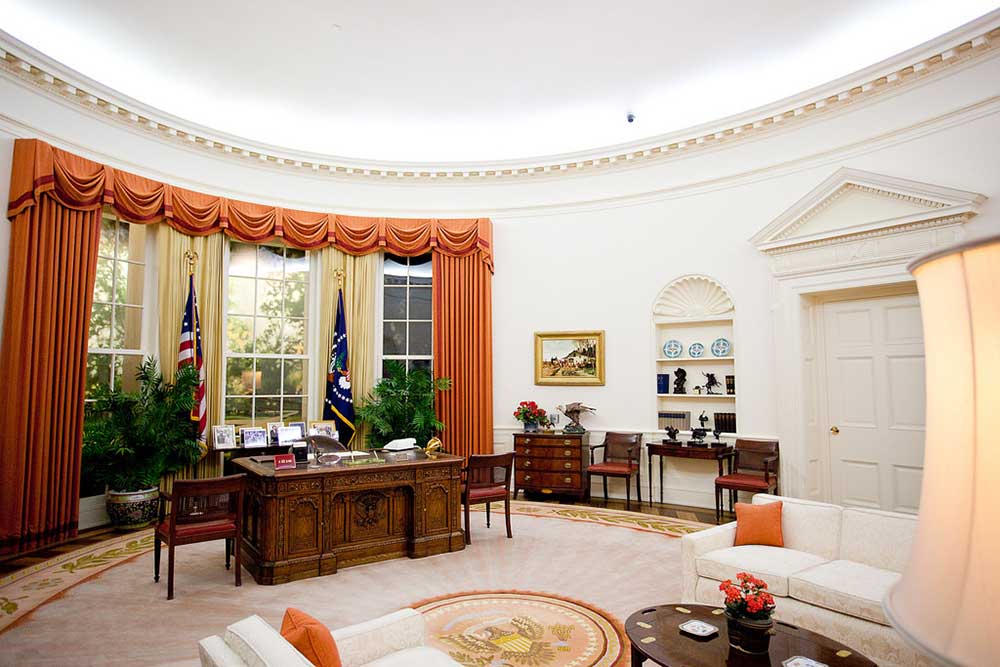
The Oval Office is in a state of transition, and now Australia faces uncharted territory in its alliance with the United States. Image: Kim Davies
As results came in this past Wednesday reporting that American businessman and reality television star Donald Trump would be the next president of the United States, financial markets around the world tumbled.
US stock futures fell more than five per cent. Asian markets dropped, and the Mexican peso slumped by 9.4 per cent. Locally, the ASX/S&P 200 closed 1.9 per cent lower and $35 billion was wiped off the value of Australian shares.
But a day later, the markets had tamped down their panic. Wall Street stocks opened higher, the NASDAQ and the S&P 500 rallied, and the Australian share market had its best day in five years.
The turbulent financial reaction to Trump’s victory encapsulates the volatility his victory has injected into the world. When it comes to predicting the results of what might be the most unexpected electoral victory in US history, nobody knows what to anticipate.
The president-elect’s campaign gave cause for concern. Erratic and unfocused, Trump evinced little grasp of policy, a critically short attention span, and — as before his three dismal debate performances — a willful refusal to prepare for important moments.
In the remaining week of the campaign, media outlets report, his staff had to ban him from using Twitter, the social media platform on which he had been letting forth a steady stream of abuse and outlandish political attacks.
For many Australian politicians, Trump’s ascent to the leadership of one of the nation’s closest allies is an awkward one. Federal opposition leader Bill Shorten is on record as calling the now–President-Elect Trump “barking mad.” Minister for Environment Josh Frydenberg had called Trump a “dropkick,” and, in October, the New South Wales parliament passed a resolution calling Trump a “revolting slug” who was unfit for office.
In Parliament House as the results were reported, members on both sides of politics looked grave, though after congratulating Trump by phone, Prime Minister Malcolm Turnbull said he expected Trump to view the world in a practical and pragmatic way.
Whether that will bear out remains to be seen. Trump has already backed off from his campaign proposal that Japan and South Korea be responsible for their own security, and should consider developing their own nuclear weapons; he now says he backs the US–Korean alliance.
On the other hand, there is no indication he will abandon his stated desire to abandon the 12-nation Trans-Pacific Partnership trade agreement — which includes Australia. He is likely to pull the United States out of the Paris Climate Accords, crippling global efforts to fight climate change.
A Russian diplomat has confirmed the Kremlin had contact with the Trump team throughout the campaign, though Trump spokespeople denied it, suggesting the pro-Russia changes Trump had inserted into the Republican Party platform during its convention might indeed lead to a shift in power in Eastern Europe.
And in the Asia–Pacific, with cool heads working to prevent conflicts over the South China Sea from metastasising into something bigger, it remains to be seen whether a Trump who infamously embroiled himself in protracted feuds with the parents of an American soldier killed in battle, a former Miss Universe, and the multitude of women who have said he sexually assaulted them can respond to foreign provocations with sobriety.
Australia might not be ready to, as former prime minister Paul Keating suggested on ABC’s 7:30 program, “cut the tag” with the United States, but leaders will be preparing to manage and monitor the alliance carefully. On the same program as Keating made his remarks, his successor and one-time opponent John Howard said he would not walk back his remarks that the thought of a Trump presidency made him “tremble.”
But perhaps the biggest danger a Trump presidency presents to Australia is more conceptual. As anti-democratic, nationalist, and authoritarian leaders — such as Turkey’s Recep Erdoğan and Hungary’s Viktor Orbán — consolidate power in democracies around the world, Trump’s antipathy to the liberal-democratic norms that his country has promulgated through its history might present the biggest challenge to US allies seeking to maintain global stability and avoid a repeat of the Trump phenomenon in their own societies.





